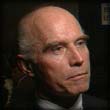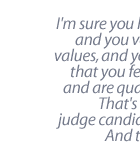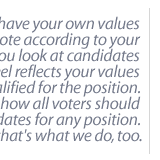






 | 
 |  |  Cook is President of Pennsylvanians for Effective Government, a business lobby which raises money for judicial
candidates who will be sympathetic to business interests.
Cook is President of Pennsylvanians for Effective Government, a business lobby which raises money for judicial
candidates who will be sympathetic to business interests.
 |  |  |
Pennsylvanians for Effective Government began in 1972 in order to help elect
"business-friendly" legislators. In recent years, you have expanded this
mission to include the judiciary. Why?
The business community woke up in the late 1980s and realized that there are
three legs to the government stool--the executive branch, the judicial branch,
and the legislative branch. We were playing quite well for over a decade in
two of those three and decided that the judicial branch are the arbitrators of
the final interpretation of all rules and regulations that are passed by the
legislature. Consequently, in '89 to the present, PEG periodically got
involved in statewide appellate court races, most of those being supreme court
races. . . Generally the idea is a George Meany quote, "It's a whole lot easier
to elect people who think like you than it is to educate them once they've been
elected." That is our motto and that is what we go by. . .

So you want to get the candidate first, so you don't have to worry about it
down the line?
Well, the whole idea of PEG is it's easier to lobby your friends than your
enemies. If we are able to put into office people who understand the free
enterprise system, who want the economy to grow, who want jobs to be created,
who want everybody's standard of living to come up, then those individuals
lobbying for business issues are going to find that their message is better
understood. It doesn't guarantee that the vote is going to be the way the
business community would prefer, and indeed in many cases it's not. But at
least they will understand the issue and be receptive to hearing the business's
point of view. . .

How do you explain to your membership, in a judicial race, who the pro-
business candidates are versus those likely to be anti-business?
If we have candidates that are coming from a lower court, we can take a look at
their opinions relative to business issues and see what opinions they have
rendered. If we have lawyers who are running for a judgeship for the first
time, and we have a couple of them this year, then we look at what cases they
have prosecuted or defended. We look at their political background. We have
an individual this year running for a statewide race who comes from a very,
very strong United Steelworkers family and I have a very strong feeling as to
how that individual would render his opinions were he elected to superior court
this year.

The judiciary was supposed to be the non-political branch that keeps an eye
on the two political branches to make sure they don't step out of way. Is this
no longer the case?
Well it depends on whether you're looking nationally or what state you're
looking in. . . When you get into a state such as Pennsylvania where you have
an elected judiciary, politics play much more heavily.

What does that mean in terms of the conduct of justice?
Once someone is elected to office, they're supposed to, shall we say, disavow
their politics. A judge in Pennsylvania is not allowed to attend a political
fundraiser, lend their name to anything that's political. When they stand for
retention after ten years on the court, they stand for retention with no
affiliation next to their name. My experience in Pennsylvania indicates that
they all do a pretty good job of trying to be non-partisan when they sit on the
bench. But they all still acknowledge the party they came from, it's their
base, they have to. . .

According to the canons here, you're not supposed to get involved in
fundraising if you're running for judge. Do you think that there really is
insulation between where that money is coming from and the judge?
 |
 |  Thin insulation, yes. The judge is not supposed to accept a check, not
supposed to make the phone call, and, to my knowledge, they do not. Obviously,
their campaign staffs are doing that. Do the judges know who the big donors
are, or, the candidates know who the big donors are? Of course, everybody
does. It's common knowledge as to who the big donors are and where the sources
of funds are. Do they know after the fact who made the contributions? Of
course they do. When PEG has made contributions it's been acknowledged by the
judicial candidate in a thank-you. . .
Thin insulation, yes. The judge is not supposed to accept a check, not
supposed to make the phone call, and, to my knowledge, they do not. Obviously,
their campaign staffs are doing that. Do the judges know who the big donors
are, or, the candidates know who the big donors are? Of course, everybody
does. It's common knowledge as to who the big donors are and where the sources
of funds are. Do they know after the fact who made the contributions? Of
course they do. When PEG has made contributions it's been acknowledged by the
judicial candidate in a thank-you. . .

I think we're used to seeing the judiciary as outside the real political
circle. Has something changed?
Well, nothing has really changed aside from an evaluation of the funding that
helps people in Pennsylvania get elected to judicial office. What we determined
was basically two thirds of the money comes from trial lawyers and one third
comes from the defense bar. When you talk about trial lawyers and you talk
about a business organization, it's very rare that they're on the same side of
the fence on an issue. Trial lawyers make their money primarily by suing
businesses. When that is acknowledged the business community realizes they
have to be a larger player in the judicial elections, so that they're
represented well before the bar.

Do you think trial lawyer contributions are influencing the judgments of the
judiciary?
There is no direct connection as to whether they influence the judgments but
there certainly is the reality that the people funding the campaigns are the
people presenting the cases before the judges. So, if you draw the conclusion
by simple connection that if the legislature and the executive branch is
accused of having their campaigns being paid for by access for political action
committees then the simple analogy is it has to carry over to the judiciary. .
.

Does anything distinguish a judicial candidate from a legislative
candidate?
It's pretty much the same game except, in Pennsylvania, by the judicial canon
of ethics, candidates are not allowed to talk about issues that may appear
before the court, where a legislative campaign or someone running for governor
is going to tell us where he stands on tort reform or labor law or taxation or
something like that. All judges can talk about are rules of procedure within
the courts.

Do you think your membership understands how important the judiciary is to
the business environment?
It's a major education process. I don't think that the business community, in
general, understands the influence that politics have in the day-to-day
operation of their companies or their lives. . . In a judicial election year
you're going to be lucky if you can have a voter turn-out that's going to be
35%. So it's not just amongst the business community, it's the population in
general that doesn't understand the significance of the judiciary.

What does that mean in terms of the vulnerability to the court?
What it really translates into is that judicial elections are very partisan in
the sense that, if you're having a voter turn-out that's going to be 20, 25%
across the state, I can guarantee you that that 25% are die-hard Republicans or
die-hard Democrats that vote in every election. So what you're probably not
seeing is the independent voter getting involved in judicial campaigns. It's
partisanship in the sense that the state committee can organize the best
campaign to get out their voters, their "super voters" as we call them in the
political arena. That's the campaign that's going to win. . .

Is PEG's objective to identify those judicial candidates who are likely to
be pro tort reform, pro medical malpractice reform?
Yes, they are business issues, they are issues that we want the legislature to
pass, the governor to sign into law. And we would certainly like to have
justices sitting on appellate courts in Pennsylvania who are going to find
those issues constitutional when they come before them. . . We want [our
members] to know as best as we can tell them who are the judicial candidates
that we believe will support the growth of free enterprise, the creation of
jobs in Pennsylvania and will not stifle the economy's development.

Is it as simple as saying,--'Listen fellows, if the trial lawyers get
another seat on the supreme court or the superior court, you've got a problem.'
Is that how this is approached to your membership?
It's basically approached by saying the trial bar is heavily funding this
campaign and consequently the business community better do something to offset
that, by looking at the other candidate in the campaign. If this person wins
the election with trial bar support you're going to have five pro-trial lawyer
justices and two pro-business justices on the supreme court. . .

If someone assumes the bench is non-partisan, non-political, that a judge
does not bring any baggage to that seat--that isn't a very practical point of
view from the point of view of a sensible businessman?
I guess my answer to that question is the last person that I've ever heard of
that fits the criteria that you just analyzed was nailed to the cross about
2000 years ago.

You don't think your typical mortal is able to get above all of those
considerations.
Not that I've seen. They wrestle with it. They do the best they can, but we
are all influenced by our upbringing. . . I'm sure you have your own values and
you vote according to your values, and you look at candidates that you feel
reflects your values and are qualified for the position. That's how all voters
should judge candidates for any position. And that's what we do, too.

home ·
how bad is it? ·
what's happening in my state? ·
how did we come to elect judges?
how should judges be selected? ·
video ·
quiz
discussion ·
links ·
synopsis ·
press ·
tapes ·
funding ·
teachers' guide
frontline ·
pbs online ·
wgbh
some images copyright © 1999 photodisc all rights reserved
web site copyright WGBH educational foundation
|